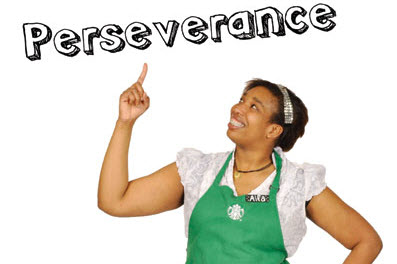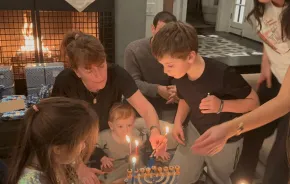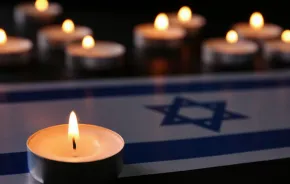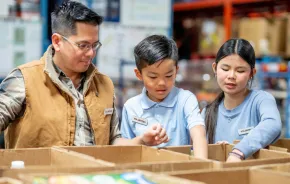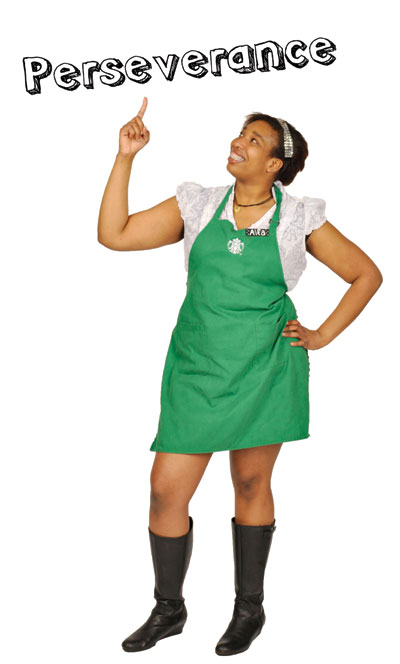 Starbucks barista Lashay Hordges Johnson, or “Alfa,” as her Starbucks customers know her, is a living example of the phrase “Crisis equals opportunity.” Alfa, now 19 years old, grew up poor in one of the wealthiest ZIP codes in the U.S., Mercer Island, Wash., in Section 8 housing. Her experience strengthened her miraculous outlook and empowered her with an attitude that propels her life.
Starbucks barista Lashay Hordges Johnson, or “Alfa,” as her Starbucks customers know her, is a living example of the phrase “Crisis equals opportunity.” Alfa, now 19 years old, grew up poor in one of the wealthiest ZIP codes in the U.S., Mercer Island, Wash., in Section 8 housing. Her experience strengthened her miraculous outlook and empowered her with an attitude that propels her life.
How did your early years affect the person that you are today?
The struggles I had in my early childhood as a big black girl taught me that I would probably have to work harder than most people and to be resilient. It was hard paying attention when you were known as the school’s charity case.
Being one of the only African-American families living on Mercer Island was initially uncomfortable. People didn’t like the fact that I was different, and I didn’t like it either.
Growing up on Mercer Island also inspired me to dream big. I’ve gained a wonderful sense of community. I became inspired to go after dreams that I thought were beyond reach. I work two jobs and go to school with the goal of being a doctor, and have made it into Seattle Central’s [Community College] national honors society. I have worked since I was 12. I suffered physical and emotional abuse from my mother, and I never wanted to be seen as a victim.
Where did you find support when you felt most challenged?
My turning point came when I found the Boys & Girls Club. They provided a safe place to go, and I made connections I never had before. The staff made time to help me, and one staff member made sure I considered college. My family wasn’t supportive of higher education when I could be “getting my hustle.” I was determined to break that cycle.
What causes you the most stress?
I get discouraged when my financial situation is dire. I worry about having the resources to succeed when financially hindered. Therefore, I am proactively pursuing scholarship opportunities so I can go to school full-time and reach my goals. I am working two jobs and getting my studying in wherever I can so I can stay in school. I am applying for a summer course at University of Washington that is focused on the introduction to the medical field.
What was the worst time in your life?
Having to defer my acceptance to Pacific Lutheran University. I proved I was good enough to get into a four-year university because I had worked so hard, but could not go because of financial challenges.
What is your source of confidence?
I have total confidence in my science classes. Learning about the functions of mitochondria, or the electronegativity of an element always puts me in a better mood. Science always had an answer that actually made sense to me. My high school science teachers were the first in my school to bend over backwards for me to make sure I understood the material.
I also did student athletic training in high school, which enriched my addiction to figuring out how the body works and the functions of life from a science point of view. I always made jokes about getting my favorite element, lithium, tattooed on my back or having a science-themed wedding. Even though going into detail about them made friends laugh, I still continue to consider getting the Lewis Dot Structure of lithium on my right shoulder and look at double helix engagement rings. When I could not afford classes I sought our free education such as studying math through the Kahn Academy.
How do you think we can make some of the most challenging learning for many kids so much fun?
I remember making up a jingle about protein synthesis to the tune of Beyonce’s "Single Ladies" at my friend’s house. I sang it for her and we both laughed so hard. Then she said to me, “You’re going to make an amazing doctor one day with your passion for science and you are so eager to help people, it would be perfect for you.” At that moment it was clear to me that going into the medical field was what I wanted to do.
What was the worst time in your life?
Having to defer my acceptance to Pacific Lutheran University. I proved I was good enough to get into a four-year university because I had worked so hard, but I could not go because of financial challenges. The happiest day of my life was when I got phone call from Seattle Education Access suggesting I claim myself as independent. I no longer had to deal with my mother, who was totally un-supportive of my educational goals, on financial aide issues. I embrace getting up at 3:30 a.m. because going to school is worth it.
What does your family think about what you are doing?
They say I am wasting my time trying to become a doctor. The more I succeed, the more I appear to them to be “uppity,” and they respect me less. I have brothers who are drug dealers and I have no relationship with them. I have an older sister who is a glorified prostitute with a son who she gave up to a man who has repeated domestic violence charges.
Who are your heroes?
Mr. Tony Scaringi and Ms. Patty Weston were the science teachers that took the extra effort to help me understand science, which influenced me to be the biology major I am today.
My high school friend Gabriella Vizzutti and her family transformed my view of education from a burden to enjoyment. I can't imagine going through high school without their support. Gabby is a talented, smart, pretty white girl and being around her and her family, and sharing in their success and happiness made me want to do it, too. This exposure was amazing. I could not run home and show my mom a good grade. She did not care that much. If I told Gabby’s mom, she was so proud.
Sheila Talley, a staff member from the Boys and Girls Club, gave me support in school and encouraged me to further my education.
Nafatier Gray, my younger sister, makes the nonstop 12-hour days worth it, because she is the second person in my family who is going to graduate. She is going to a university in San Francisco next year.
How has Starbucks impacted you?
When I was in Section 8 housing, Starbucks would donate their pastries and perishables to the Boys & Girls Club. I would get free hot chocolate at the Starbucks reading time at Barnes & Noble. I wanted to work at Starbucks because of that. Friends at Starbucks encouraged me to go to school and offered support and friendship in a great work environment.
When we enter Starbucks, you’re the morning delight. My 11-year-old daughter, Maya, wants to know, what makes you happy all the time?
The first thing I do in the morning is have spontaneous dance parties. I just treat people how I want to be treated. I like to be treated like I’m a princess, so everyone should be royalty.
What type of doctor do you hope to be?
Not “hope” — I will be an orthopedic surgeon. When I first came to Mercer Island, I wanted to be them: a white kid who is privileged, loved and supported by her parents. Now I’ve made up my own quote about life: “Why be someone else, when you can be better?”
Being an orthopedic surgeon and able to tend to kids, the elderly or athletes is my plan. I will run a local private practice, and throughout this journey I want to teach young kids and mentor them to continue to keep the studies of science alive. At the end of the day, I will be teaching and transforming lives and will be glad to have helped my community.
Editor's note: This article has been edited from its original version to correct errors.



